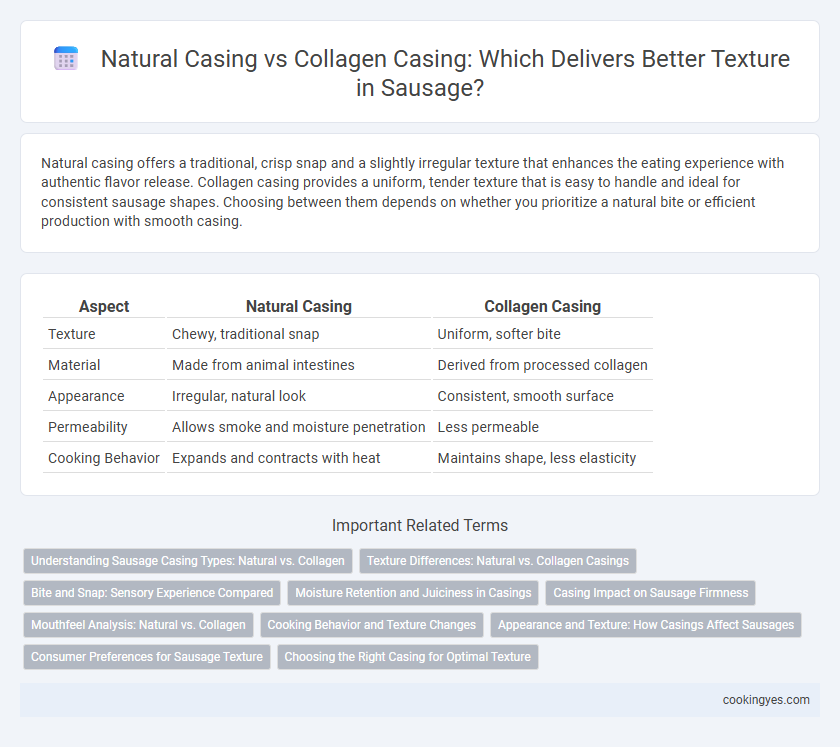Natural casing offers a traditional, crisp snap and a slightly irregular texture that enhances the eating experience with authentic flavor release. Collagen casing provides a uniform, tender texture that is easy to handle and ideal for consistent sausage shapes. Choosing between them depends on whether you prioritize a natural bite or efficient production with smooth casing.
Table of Comparison
| Aspect | Natural Casing | Collagen Casing |
|---|---|---|
| Texture | Chewy, traditional snap | Uniform, softer bite |
| Material | Made from animal intestines | Derived from processed collagen |
| Appearance | Irregular, natural look | Consistent, smooth surface |
| Permeability | Allows smoke and moisture penetration | Less permeable |
| Cooking Behavior | Expands and contracts with heat | Maintains shape, less elasticity |
Understanding Sausage Casing Types: Natural vs. Collagen
Natural sausage casings, derived from animal intestines, offer a traditional, chewy texture prized for its ability to retain moisture and enhance flavor complexity during cooking. Collagen casings, made from processed animal proteins, provide a uniform thickness that ensures consistent bite and appearance, favored in commercial sausage production. Texture differences arise as natural casings yield a more irregular, artisanal mouthfeel, while collagen casings deliver a smooth, predictable chew essential for mass-produced sausages.
Texture Differences: Natural vs. Collagen Casings
Natural casings offer a unique, chewy texture and snap that enhances the eating experience, providing an authentic bite often preferred in traditional sausages. Collagen casings create a uniform, smoother texture that makes sausages easier to handle and cook consistently, appealing to commercial production. The textural contrast between the wrinkled natural casing and the sleek collagen casing influences both mouthfeel and overall sausage quality.
Bite and Snap: Sensory Experience Compared
Natural casing offers a unique bite and snap due to its collagen-rich, animal intestine origin, providing an authentic, crisp texture that enhances the overall sensory experience of sausages. Collagen casing, derived from processed animal proteins, delivers a more uniform snap but tends to be less elastic and slightly softer than natural casing. Sausages with natural casing often appeal to consumers seeking a traditional, satisfying mouthfeel, while collagen casings prioritize ease of use and consistency in bite.
Moisture Retention and Juiciness in Casings
Natural casings, derived from animal intestines, offer superior moisture retention and juiciness due to their porous structure, allowing sausages to breathe and release steam during cooking, which enhances texture. In contrast, collagen casings, made from processed collagen proteins, provide a uniform, thicker barrier that limits moisture evaporation but can sometimes create a firmer bite and slightly reduced juiciness. Selecting natural casings typically results in a more tender, juicy sausage texture, while collagen casings are preferred for consistent shape and durability, albeit with a potential compromise in moisture retention.
Casing Impact on Sausage Firmness
Natural casings, derived from animal intestines, provide a distinctive snap and chewiness that enhances sausage firmness through their irregular, porous structure that allows moisture to escape during cooking. Collagen casings, made from processed animal hides, offer a more uniform texture but result in a softer bite due to their smoother, less breathable surface. The choice between natural and collagen casings significantly influences the final sausage texture, with natural casings producing a firmer, more traditional mouthfeel while collagen casings yield a tender, consistent firmness.
Mouthfeel Analysis: Natural vs. Collagen
Natural sausage casings, made from animal intestines, provide a chewy, tender bite with a slightly irregular texture that enhances the overall mouthfeel, delivering a traditional eating experience. Collagen casings, derived from processed collagen protein, offer a consistent, smoother texture that can be thinner and less chewy, contributing to a more uniform and easily biteable sausage. Mouthfeel analysis reveals natural casings excel in providing robust snap and variation, while collagen casings favor convenience and uniformity without sacrificing structural integrity.
Cooking Behavior and Texture Changes
Natural casing offers a tender, slightly chewy texture that expands and crisps evenly during cooking, enhancing the sausage's bite and snap. Collagen casing typically provides a uniform and consistent texture, resisting breakage and retaining moisture for juicier results. Cooking behavior differs as natural casings breathe and shrink naturally, while collagen casings maintain shape stability and prevent splitting under high heat.
Appearance and Texture: How Casings Affect Sausages
Natural casings, derived from animal intestines, provide a traditional, irregular appearance and a snap that enhances the overall eating experience. Collagen casings, made from processed animal proteins, offer a uniform, smooth surface and a softer bite, ideal for consistent product presentation. The choice between these casings significantly impacts sausage texture, with natural casings favored for firmness and collagen casings for tenderness.
Consumer Preferences for Sausage Texture
Natural casings are favored by consumers who prefer a traditional, tender snap and uneven texture in their sausages, enhancing the eating experience with their natural elasticity. Collagen casings offer a consistent, firmer texture that appeals to those seeking uniformity and easier handling during cooking, often found in mass-produced sausages. Consumer preferences vary regionally, with natural casings more popular in artisanal and specialty markets, while collagen casings dominate commercial production due to their convenience and stability.
Choosing the Right Casing for Optimal Texture
Natural casings, made from animal intestines, provide a traditional, chewy texture with superior snap, enhancing the eating experience for artisanal sausages. Collagen casings, derived from processed protein, offer consistent thickness and uniformity, ideal for commercial sausage production with a smoother bite. Selecting the right casing depends on the desired texture outcome: natural casings create a robust, authentic snap, while collagen casings yield a tender, controlled chew.
Natural casing vs collagen casing for texture Infographic

 cookingyes.com
cookingyes.com